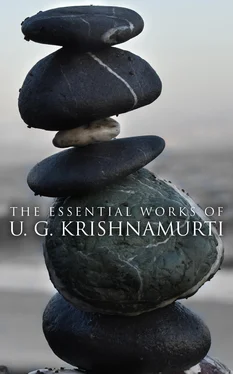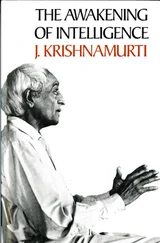U. Krishnamurti - The Essential Works of U. G. Krishnamurti
Здесь есть возможность читать онлайн «U. Krishnamurti - The Essential Works of U. G. Krishnamurti» — ознакомительный отрывок электронной книги совершенно бесплатно, а после прочтения отрывка купить полную версию. В некоторых случаях можно слушать аудио, скачать через торрент в формате fb2 и присутствует краткое содержание. Жанр: unrecognised, на английском языке. Описание произведения, (предисловие) а так же отзывы посетителей доступны на портале библиотеки ЛибКат.
- Название:The Essential Works of U. G. Krishnamurti
- Автор:
- Жанр:
- Год:неизвестен
- ISBN:нет данных
- Рейтинг книги:5 / 5. Голосов: 1
-
Избранное:Добавить в избранное
- Отзывы:
-
Ваша оценка:
- 100
- 1
- 2
- 3
- 4
- 5
The Essential Works of U. G. Krishnamurti: краткое содержание, описание и аннотация
Предлагаем к чтению аннотацию, описание, краткое содержание или предисловие (зависит от того, что написал сам автор книги «The Essential Works of U. G. Krishnamurti»). Если вы не нашли необходимую информацию о книге — напишите в комментариях, мы постараемся отыскать её.
Content:
The Mystique of Enlightenment
Courage to Stand Alone
Mind is a Myth
No Way Out
Thought is Your Enemy
The Natural State
The Essential Works of U. G. Krishnamurti — читать онлайн ознакомительный отрывок
Ниже представлен текст книги, разбитый по страницам. Система сохранения места последней прочитанной страницы, позволяет с удобством читать онлайн бесплатно книгу «The Essential Works of U. G. Krishnamurti», без необходимости каждый раз заново искать на чём Вы остановились. Поставьте закладку, и сможете в любой момент перейти на страницу, на которой закончили чтение.
Интервал:
Закладка:
_______
Q: If you were to sum up your teaching in one phrase, what would it be?
UG:The phrase would be "I cannot help you."
Q: Still , people do come to see you, both here in Switzerland and in India. You must help them in some way, or they must think you help them in some way, otherwise they wouldn't come.
UG:Some come out of curiosity. But to those who come because they seriously wish to understand me, all I can say is I have nothing to say. I cannot help anyone at all, and neither can anyone else. You do not need help; on the contrary, you need to be totally helpless — and if you seek to achieve this helplessness through my help, you are lost.
Q: Can you speak of the difference between your state and the state of being of most people?
UG:I think it is very slight; there is only a hair's breadth difference.
Q: But your body has undergone biological changes.
UG:Yes, but I have no secret hidden in a secret place. I have nothing to offer. All I can offer is the assurance that all inquiry, like all philosophical discussion, is useless, that no dialogue is possible, and that your questions, like everyone else's, serve no purpose whatsoever. Understanding, in the sense in which I mean it, is that state of being where the questions aren't there any more.
Q: You mean it is a state of not thinking?
UG:It is a state where thinking and life are not two things, but one thing. It is not an intellectual state; it is more like a state of feeling (although I use the word 'feeling' in a different sense than that in which you use the word). It is a state of not seeking. Man is always seeking something — money, power, sex, love, mystical experience, truth, enlightenment — and it is this seeking which keeps him out of his natural state. And although I am in a natural state, I cannot help someone else, because it is my natural state, not his.
Q: Do you mean to say that if I stop seeking, a change will take place in me?
UG:Yes, it will. And when I've said "Yes, it will," then what? What good is my assurance to you? It is not good at all — it is utterly worthless — so you don't listen to me or anybody. Listening to other people is what you've been doing all your life — it's the cause of your unhappiness. You are unique. There is no reason for your wanting to be like another chap. You can't be like him, anyway. This wanting — wanting to listen, wanting to understand, wanting to be like such-and-such an individual — has come about because society is interested in creating a perfect man; but there is no such thing as a perfect man — this is our problem. All we can do is be ourselves, and no one can help you be that. He can teach you how to ski or fix a motor car, but he cannot teach you anything important.
Q: Not even Buddha or Christ?
UG:Why do you bother about those fellows? They are dead. You should pitch them in the river. And yet you don't; you keep listening to someone (it makes no difference whom), and you keep hoping that somehow, tomorrow or the next day, by listening more and more, you will get off the merry-go- round. You listen to your parents and to your teachers at school, and they tell you to be good and dutiful and not be angry and so on, and that doesn't do any good, and so you go and learn how to do Yoga, and then presently some old chap comes along and tells you to be choicelessly aware. Or maybe you find someone in the 'holy business', and he does miracles — he produces some trinkets out of the air, and you fall for it — or perhaps he touches you, and you see some blue light or green light or yellow light or God knows what, and you hope he will help you experience enlightenment. But he cannot help you. It is not something that can be captured, contained or given expression to. I do not know if you see the utter helplessness of the situation, and how, if anyone thinks he can help you, he will inevitably mislead you, and the less phoney he is, the more powerful he is, the more enlightened he is, the more misery and mischief he will create for you.
Q: Have you any interest in the question of reincarnation?
UG:I am more interested in the question "Are you born?" Can you tell me? You yourself — can you be sure that you are born? Can you experience your own birth? You cannot. You can experience the births of others and the deaths of others, and you think that some day you will experience your own death. But there is no guarantee you will experience your own death. Your structure which is interested in understanding your own death and your own birth won't be there. So life as such has no beginning and no end; it is a beginningless and endless movement, and you are only an expression of it. You are only an expression of life, like a bird or a worm or a cloud.
Q: But with the singular difference that I am conscious of myself, and the worm is not.
UG:You are conscious of yourself through thought (by which I mean not just conscious thought, but that conditioning which transforms the life that passes through you into feelings, into pleasure and pain). And this thought is not yours; it is what you have learned from others, it is second-hand, it belongs to everybody. You belong to everybody. So why don't you accept the natural thing? If you accept the natural thing, all falls into its own rhythm: there is nothing to do, there is nothing to control, there is nothing to ask. You don't have to do a thing. You are finished.
_______________
Q: Well, one can't just sit on a hill and rot.
Q: Well, that's what I'm doing.
UG:Still rotting, no matter where you are. Not necessarily on a hill; right in the midst of all your activities the rotting is going on. And the burden is that you can one day, somehow, through some miracle or through the help of somebody, do something about it. You can't do a thing about it, let's face it. No miracles! Nobody can help you!
Q: So, if nobody can help....
UG:And you do not know how to help yourself — that's the point. You know, these two are not different things. If you really come to the point that no outside agency can be of any help, automatically your total helplessness also goes. These are the obverse and reverse of the same coin. You still have some hope — the fact that you are here means you have not given up hope. Or, if you don't come here, you will go to see somebody else in India — the avatar himself, the god himself walking on the Earth. Probably he will produce some trinkets out of thin air, but what good is that? No matter who he is, if you had no hope, you wouldn't listen to him, you wouldn't touch a book, you wouldn't listen to anybody in this world. Not that you would be proud or anything; but all outside agency in any form, on any level, would be finished once and for all.
"I don't know what to do. I am helpless, totally helpless" — as long as you think you are totally helpless, you will depend on some outside agency. That can be finished in one stroke: in one blow your dependence on outside agencies is finished, and, along with it, the idea that you are helpless, that you don't know what to do about it, is also gone. But you are waiting for something to happen or for some grace to descend upon you — you are still depending upon some outside agency. I can tell you that there is no power outside of you — no power. This does not mean that you have all the attributes that you read about of the super-duper gods; but there is no power outside of you. If there is any power in this universe, it is in you.
Читать дальшеИнтервал:
Закладка:
Похожие книги на «The Essential Works of U. G. Krishnamurti»
Представляем Вашему вниманию похожие книги на «The Essential Works of U. G. Krishnamurti» списком для выбора. Мы отобрали схожую по названию и смыслу литературу в надежде предоставить читателям больше вариантов отыскать новые, интересные, ещё непрочитанные произведения.
Обсуждение, отзывы о книге «The Essential Works of U. G. Krishnamurti» и просто собственные мнения читателей. Оставьте ваши комментарии, напишите, что Вы думаете о произведении, его смысле или главных героях. Укажите что конкретно понравилось, а что нет, и почему Вы так считаете.












